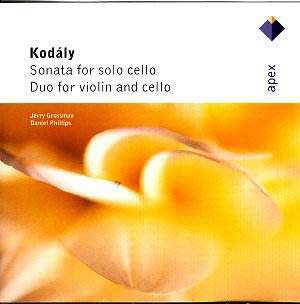The really excellent budget Apex series continues
to release impressive discs that do not always pander to the mainstream
public taste. Take the present issue; these marvellous pieces will
be well known to specialist chamber-music lovers, or aficionados
of the particular instruments, but are unlikely to figure in many
general collections. At this give-away price, music lovers can take
a chance and indulge in some new repertoire; I guarantee they will
be rewarded with stimulating music that is as original as anything
in Bartók, and in performances of real power and commanding
stature.
The provenance of these Apex issues is not always
clear, but the presence in this case of senior Nonesuch producer
Judith Sherman, suggest they may be the original source. Whatever
the case, the recorded sound is beautifully projected and clear,
with plenty of bloom and a natural acoustic. This is such a logical
coupling that Iím surprised more record companies have not exploited
it; there are one or two notable rivals, such as an Arte Nova recording,
but I can hardly imagine more persuasive accounts than the ones
given here.
The music itself is original and full of surprises.
Kodályís ethnomusicolgical field studies with his friend
and compatriot Bartók yielded great results for them both,
and many folk elements find their way into the two present works.
Folk rhythms, harmonies, sonorities and direct quotation of Magyar
melodies all shape the contour and style of the pieces to great
effect. As with Bartók, there is no hint of pastiche, but
a complete integration into the composerís own particular way of
working. Thus, the imperious opening of the Solo Cello Sonata
has a romantic yearning that almost sounds Brahmsian, yet manages
to use sparse fourths and fifths that tell us where the inspiration
lies. The sumptuous sound that Jerry Grossman gets from his instrument
also manages to convey the size and massive scope of the piece.
He never loses sight of the strict formal procedures binding the
work together, and the performance as a whole strides the perfect
line between tradition and modernity. The marvellously invigorating
finale, marked Allegro molto vivace, shows the artist at
full stretch, and the virtuosity is thrilling.
The Duo is in many ways even more remarkable.
Kodály conjures up an amazing variety of textures for just
two instruments, and at times the piece sounds like a full blown
Bartók string quartet! The adagio second movement is Ďfull
of suppressed passioní(to quote the concise but excellent liner
note) and again the finale bursts with excitement and invention.
The rapport between the two players is well-nigh ideal, and the
give-and-take demonstrates that the players really understand the
intricate patterns of counterpoint that the composer is weaving.
This issue confirms to me that the Apex series
is one of the most stimulating and adventurous budget series around.
Whatever their provenance, the performances all seem, at least to
my ears, to be consistently of the very highest quality. This Kodály
release deserves success, and no-one investing their hard earned
fiver is likely to be disappointed.
Tony Haywood


![]() See
what else is on offer
See
what else is on offer 